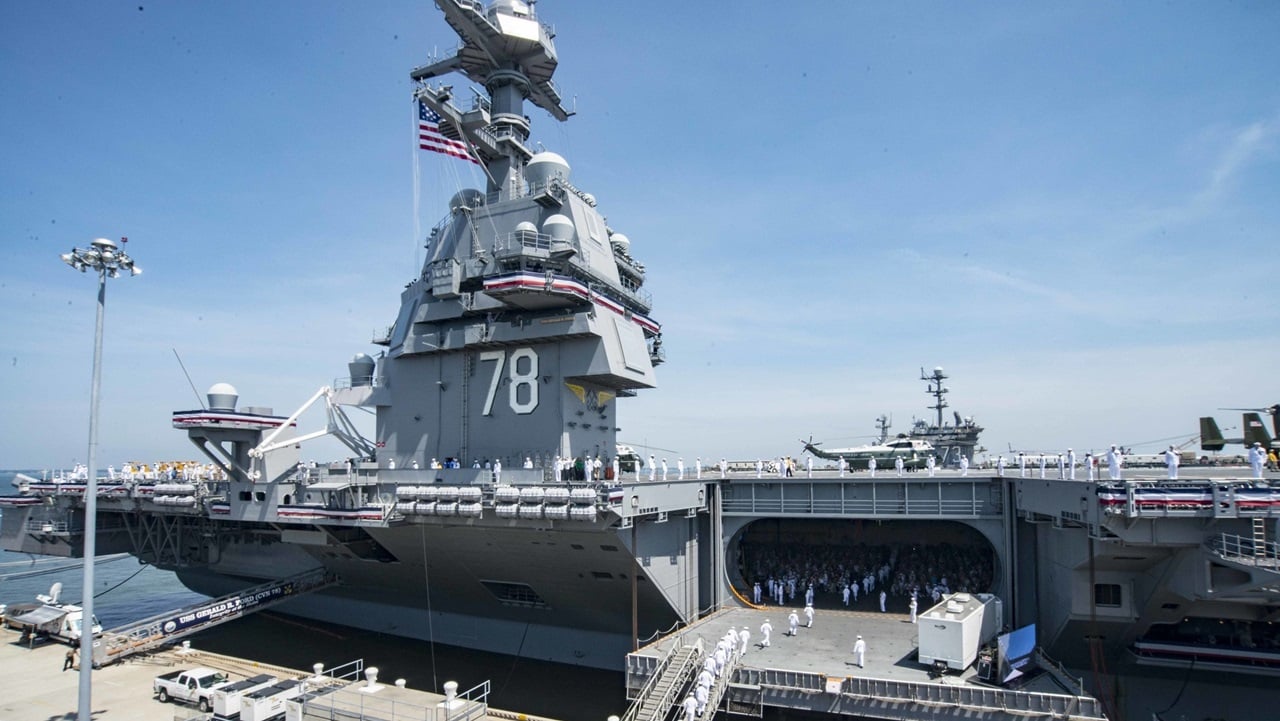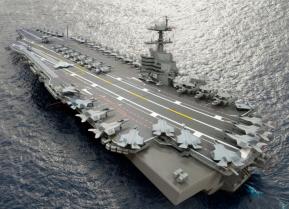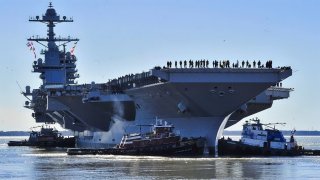Ford-Class Aircraft Carrier USS John F. Kennedy Looks Unstoppable
Considering the ongoing barrages of rockets, drones, and missiles being launched by the Iranian-backed Houthis in the Red Sea towards U.S. warships, the timely introduction of the Ford-Class aircraft carrier USS John F. Kennedy will support America’s deterrence strategy.
Summary: The U.S. Navy is escalating its production of Ford-class nuclear-powered aircraft carriers to bolster security amidst heightened tensions and Houthi attacks in the Red Sea. The advanced Ford-class, including ships like the USS Gerald R. Ford and USS John F. Kennedy, represents a technological leap over the aging Nimitz-class with features such as larger decks, enhanced propulsion, and the Electromagnetic Aircraft Launch System (EMALS). The USS Gerald R. Ford, commissioned in 2017, leads this new class, with the USS John F. Kennedy set for delivery in 2024, aiming to strengthen U.S. naval capabilities and deterrence in strategic regions like the Indo-Pacific.
Ford-Class CVN-69 USS John F. Kennedy Update
The U.S. Navy is doubling down its efforts to produce additional Ford-class nuclear-powered aircraft carriers, according to the Executive Director for the service’s Program Executive Office Carriers.
Amidst rising tensions in the Red Sea and increased Houthi-launched attacks targeting U.S. warships, the introduction of these advanced aircraft carriers is paramount for security. Currently, USS Carl Vinson, USS Ronald Reagan, USS Gerald R Ford and USS Dwight D Eisenhower are operating in operations across the Eastern Mediterranean.
The Ford-class is the last carrier series procured by the Navy to replace its aging Nimitz-class predecessors. The lead ship of the class, Ford, was commissioned back in 2017 and officially entered service in 2022.
The history of the Ford-class aircraft carriers:
The Nimitz-class has dominated the waters since their introduction more than forty years ago. While this class has proven to be a formidable source of power projection for the Navy, these ships have limited ability to support more recent technological advances.
The service required a new carrier-class, featuring larger flight decks, more enhanced propulsion plant designs, an Electromagnetic Aircraft Launch System and other key advances. The Gerald R. Ford-class was conceptualized to embody these modifications.
Introducing USS John F. Kennedy
Back in 2009, Huntington Ingalls Industries Northrop Grumman Shipbuilding penned a $374 million contract with the Navy to develop the USS John F. Kennedy. Though this new carrier was intended to be completed by 2018, this timeline was pushed back due to construction and budgetary constraints.
Today, USS John F. Kennedy is roughly 90% complete. Subsequent ships in this class, USS Enterprise and USS Dorris Miller, are approximately 35% complete, according to the manufacturer.

USS John F. Kennedy, and its Ford predecessor, are expected to reach 160 sorties per day with the capacity to hit 270 in wartime. The incorporation of the Electromagnetic Aircraft Launch System and the Advanced Arresting Gear System will enable these carriers to achieve such high SGRs.
Unlike the steam piston catapult featured on the Nimitz-class carriers, the inclusion of EMALS uses electric currents to create a magnetic field, an improved approach for accelerating aircraft efficiently.
When will USS John F. Kennedy be delivered?
Most recently, the delivery date of the John F. Kennedy has been delayed to 2024, to accommodate work on the ship’s Post Shakedown Availability.
As detailed by the U.S. Naval Institute, “This approach will prepare CVN 79 as the first FORD class aircraft carrier to operate in the Indo-Pacific region and decrease the amount of time CVN 79 would be required to be at the shipyard after ship delivery to conduct the PSA,” adding that “CVN 79s PSA will align to a traditional period of resolving discrepancies discovered during trials. The revised strategy maintains the overall ‘ready for deployment workups’ milestone for CVN 79.”
Considering the ongoing barrages of rockets, drones and missiles being launched by the Iranian-backed Houthis in the Red Sea towards U.S. warships, the timely introduction of USS John F. Kennedy will support America’s deterrence strategy.
About the Author: Maya Carlin
Maya Carlin, National Security Writer with The National Interest, is an analyst with the Center for Security Policy and a former Anna Sobol Levy Fellow at IDC Herzliya in Israel. She has by-lines in many publications, including The National Interest, Jerusalem Post, and Times of Israel. You can follow her on Twitter: @MayaCarlin.
Image Credit: Shutterstock.


